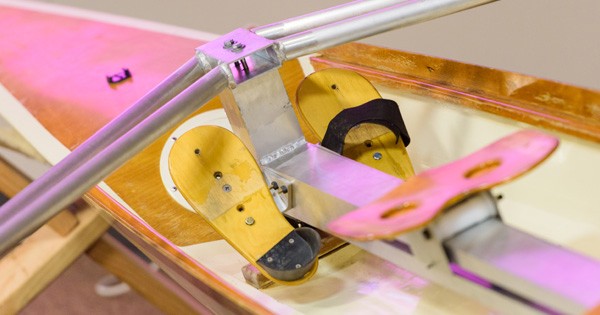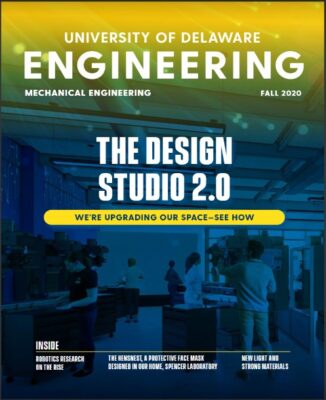At UD, engineering students are making next-generation consumer products
When a Maryland-based boat kit company wanted help designing a component that rowers sit in, they contacted a University of Delaware engineer with ideal expertise. Jenni Buckley, an associate professor of mechanical engineering and a rower in the UD Athletics Hall of Fame, advises students in Senior Design, a one-semester capstone engineering design program.
A four-student team advised by Buckley developed a new sliding seat rigger unit, made largely of aluminum, for Chesapeake Light Craft. Last week, the team, which includes two members of the UD men’s rowing club team, presented their design to their sponsor and a panel of evaluators, alumni, and visitors. The team touted their prototype’s strengths, such as its originality, compatibility with the boat, flexion, and weight.
“It exceeds my expectations a great deal,” said John Harris, CEO of Chesapeake Light Craft, from the audience. With minimal tweaks, this device could likely deliver ideal performance at a reasonable price.
“I’m very excited. I can’t wait to get it in the water,” he said.
Celebrating senior design
This boat part was just one of 40 projects UD student groups presented at the Senior Engineering Design Celebration on Dec. 13 in Clayton Hall. There were more than 200 participants and more than 300 audience members in attendance.
The mechanical engineering and biomedical engineering departments collaborate on this semester-long course. Every senior in these two departments participates, and students in other departments can choose to join as well.
Student teams are asked to solve real-world problems that could help sponsors improve their businesses or make new products. The projects covered a broad range of subjects. For example, one team designed a wearable birthing simulator with a novel fluid release mechanism, which can be used to help train healthcare workers who deliver babies. Another worked to improve 3D printing of concrete. One team was tasked with developing a free-standing electric vehicle charging unit. Another developed a bike pedal for people recovering from anterior cruciate ligament (ACL) injuries.
Students develop prototypes utilizing the Mechanical Engineering Design Studio, a 24/7, open-access makerspace to design, fabricate and test ideas. They are bound by industry standards and budgetary constraints.
“We had another fantastic year for Senior Engineering Design, with upwards of 40 industry, academic, and community partners,” said Buckley. “Every year, the quality of what our students produce as final designs keeps going up and up. This is the first class of mechanical and biomedical engineering students who have grown up in our design studio all four years in the program. Design is just second nature for them.”
Some Senior Design teams develop prototypes on the threshold of commercialization, and several projects have yielded company-sponsored patent applications in the program’s history.
Dawn Elliott, chair of the Department of Biomedical Engineering, said: “I was so impressed with our students and their creativity in solving real-world problems. This is not just a class; it is the accumulation of four years of design and engineering training applied to a sponsor’s need. Several projects, including the self-cleaning laparoscope that I chose for the Chair’s award, have potential for commercialization, which is exciting.”
This experience influences UD engineers beyond graduation.
“The greatest evidence of this course’s success is the high volume of positive reviews and enthusiastic feedback we receive from alumni who have achieved success in industry,” said Ajay Prasad, chair of the Department of Mechanical Engineering. “Many of our alumni return as industry sponsors with new projects for our students, who provide them with value and receive real-world experience in return.”
Four teams from Padua Academy, a high school in Wilmington, also presented projects through a brand new High School Partner Program. Sophomore, junior, and senior year high school students worked on solutions for patients who have a fear of needles and presented their findings to the same panel of experts that judged the UD projects.


